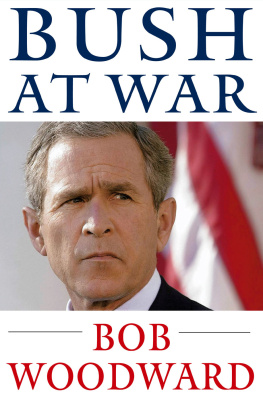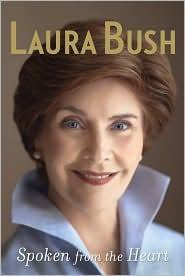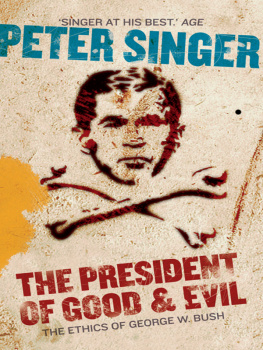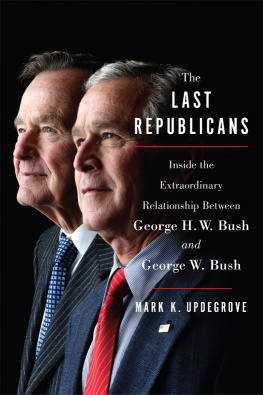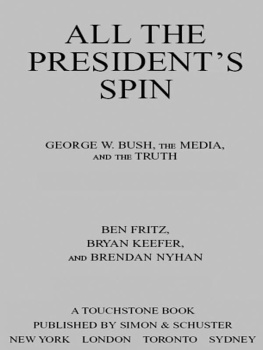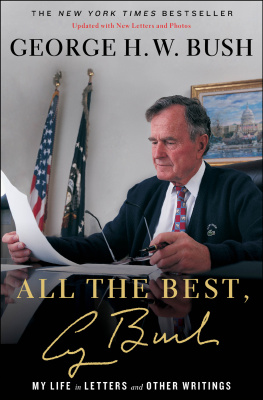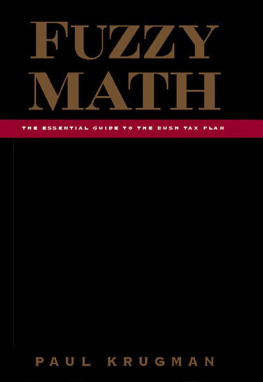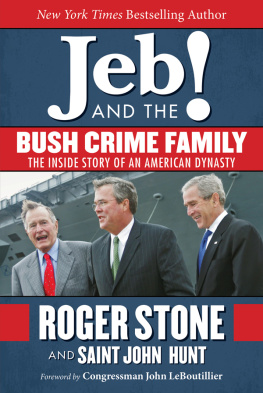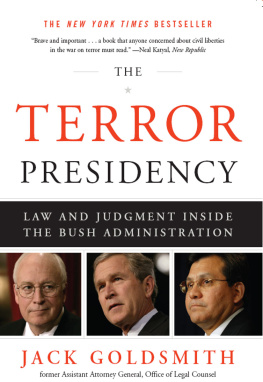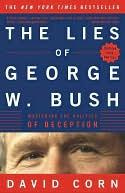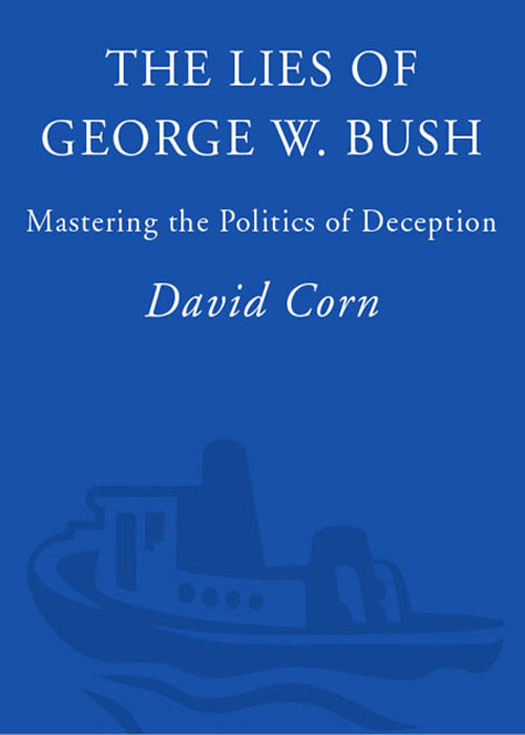
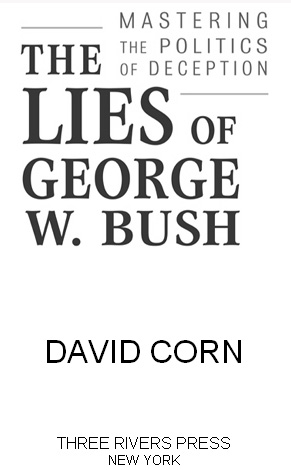
Contents
FOR WELMOED
When regard for the truth has broken down or even slightly weakened, all things will remain doubtful.
St. Augustine
Introduction: A False Restoration
Some people think its inappropriate to draw a moral line. Not me. For our children to have the lives we want for them, they must learn to say yes to responsibility... yes to honesty.
George W. Bush, June 12, 1999
G eorge W. Bush is a liar. He has lied large and small. He has lied directly and by omission. He has misstated facts, knowingly or not. He has misled. He has broken promises, been unfaithful to political vows. Through his campaign for the presidency and his first years in the White House, he has mugged the truthnot merely in honest error, but deliberately, consistently, and repeatedly to advance his career and his agenda. Lying greased his path toward the White House; it has been one of the essential tools of his presidency. To call the 43rd president of the United States a prevaricator is not an exercise of opinion, not an inflammatory talk-radio device. This insult is supported by an all too extensive record of self-serving falsifications. So constant is his fibbing that a history of his lies offers a close approximation of the history of his presidential tenure.
While politicians are often derided as liars, this charge should be particularly stinging for Bush. During the campaign of 2000, he pitched himself as a candidate who could restore honor and integrity to an Oval Office stained by the misdeeds and falsehoods of his predecessor. To brand Bush a liar is to negate what he and his supporters claimed as his most basic and most important qualification for the job; it is a challenge, in a sense, to his legitimacy. But it is a challenge fully supported by his words and actions, as well as those of the aides and officials who speak and act for him. The list of falsehoods is long. And only one man bears responsibility for thatthe fellow who campaigned in an airplane christened Responsibility One.
Does the truth matter to Bush? No more than winning office, gaining a political advantage, or prevailing in a policy dispute. He has lied not only to cover up inconvenient matters or facts, or out of defensiveness when caught in a contradiction or an uncomfortable spot. He has engaged in strategic lyingthat is, prevaricating about the fundamental elements of his presidency, including his basic goals and his own convictions. He has used lies to render himself and his ideas more enticing to voters and the public. And that raises the question: has lying been critical to his success? Were Bush and his proposalsunadorned by fictionnot sufficiently appealing?
A liar in the White House is not a remarkable development. Most presidents lie, many brazenly and with impunity. Only a few have had to pay a political cost for their dissimulations. In 1840, William Henry Harrison, the Whig candidate for president, told potential voters he had been born in a log cabin. Not true at all. He was a scion of an aristocratic family, and he had grown up in a red-brick mansion on the James River in Virginia. But he won the contest. Twenty years later, Abraham Lincolnhis supporters hailed him as Honest Abewas running for president, and advocates presented Lincoln to voters as a country lawyer. Nohe had been reared in rural Illinois, but by the time he was a presidential wannabe, he had become one of the nations leading attorneys, representing railroads and other corporations.
In more recent decades, presidents have lied to get their way or hide embarrassing truths. In a prePearl Harbor fireside chat in 1941, Franklin Delano Roosevelt, looking to persuade Americans that the nation should side with Britain in its war against Nazi Germany, reported that a German submarine had launched an unprovoked attack on the USS Greer. Left unsaid was the fact that the Greer had been cooperating with a British naval effort to find the sub and destroy it. On August 9, 1945, three days after the United States struck Hiroshima with an atomic bomb, Harry Truman, in a radio speech, said, The world will note that the first atomic bomb was dropped on Hiroshima, a military base. That was because we wished in this first attack to avoid, in so far as possible, the killing of civilians. Yet Hiroshima was a city, not a military base. Its population at that time included about 350,000 civilians. In May 1960, when the Soviet Union announced it had shot down an American U-2 spyplane flying over its territory, Dwight Eisenhower had his aides say that this aircraft had been only a weather plane that had wandered 1,500 miles off course. But after Moscow produced wreckage of the plane and the pilot of the aircraft, the Eisenhower administration publicly conceded it had been conducting U-2 overflights. At the time, many Americans were genuinely shocked that a White House had lied. Later, Eisenhower explained why he had subordinates spin for him during the U-2 episode: When a president has lost his credibility, he has lost his greatest strength.
John Kennedy, while campaigning in 1960, declared that the United States was on the wrong side of a dangerous missile gap with the Soviet Union. But there was no missile gap in the Soviets favor, and Kennedy had received classified briefings reporting that. In August 1964, Lyndon Johnson told congressional leaders that two American destroyers were attacked without provocation by the North Vietnamese in international waters in the Gulf of Tonkin. He asked Congress to immediately pass legislation approving a retaliatory attack, and Congress obliged. Years later, the public learned Johnson had misled Congress.
Richard Nixon lied about Vietnam (as a candidate he claimed he had a secret plan to end the war, and win the peace, but he did not; as the president, he denied he was covertly bombing Cambodia, when he was). He lied about Watergate, too, declaring famously, I am not a crook. Turned out he was, and, because he was caught lying, he became the first president to resign.
When the Iran-Contra scandal began to unfold in the fall of 1986, Ronald Reagan said that his administration did notrepeat, did nottrade weapons or anything else for hostages with Iran and that there is no [U.S.] government connection with the efforts to supply weapons to the Contra rebels fighting the Sandinista government in Nicaragua. He was wrong on both counts. Reagan, a champion falsifier who routinely got facts wrong about his own life and important policy matters (most air pollution is caused by trees and plants; submarine-launched nuclear missiles once fired can be recalled), later offered a new and highly original explanation for his Iran-Contra misstatements: A few months ago I told the American people I did not trade arms for hostages. My heart and my best intentions still tell me thats true, but the facts and the evidence tell me it is not. That is, he lied because he was out of touch with reality.
Reagans vice presidenta fellow named George Herbert Walker Bushalso lied about Iran-Contra. When the Iran-Contra affair was first exposed, Bush denied he had been in the loop. Yet government documents subsequently released disclosed that Bush had attended many high-level administration meetings on the Iran initiative. And in his private diarywhich he managed to withhold from Iran-Contra investigators until December 1992, a month after he lost his reelection bidBush had written, Im one of the few people that know fully the details of the Iran affair. More famously, during his acceptance speech at the 1988 GOP convention, Bush issued a solemn vow: Read my lips: no new taxes. Two years later, in an attempt to address the budget deficit, he signed legislation raising taxes.
Next page

